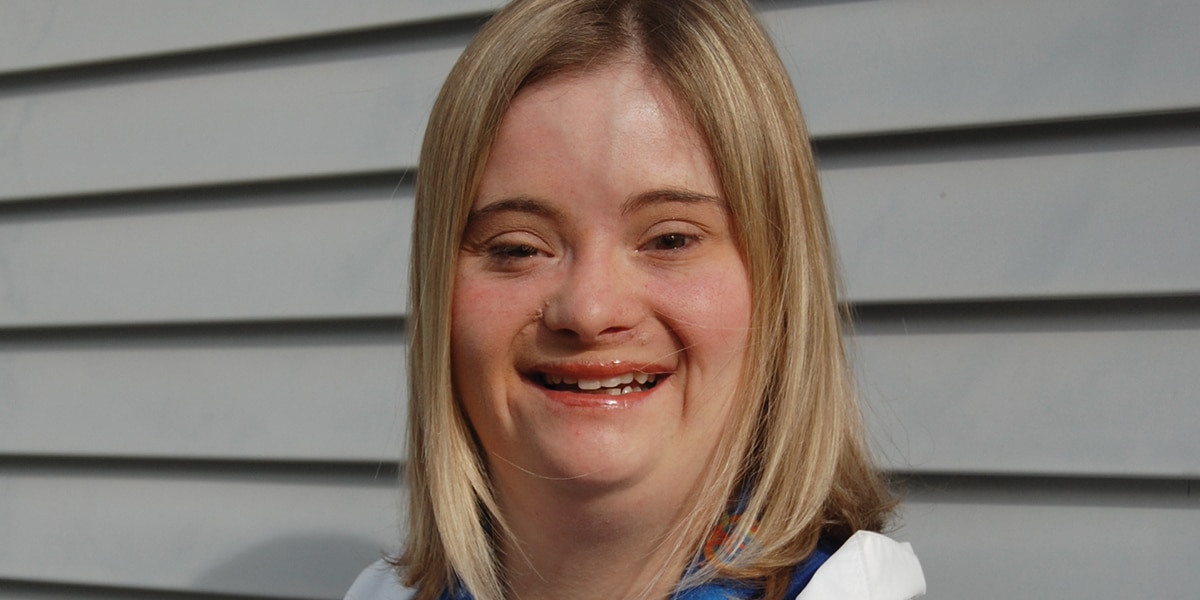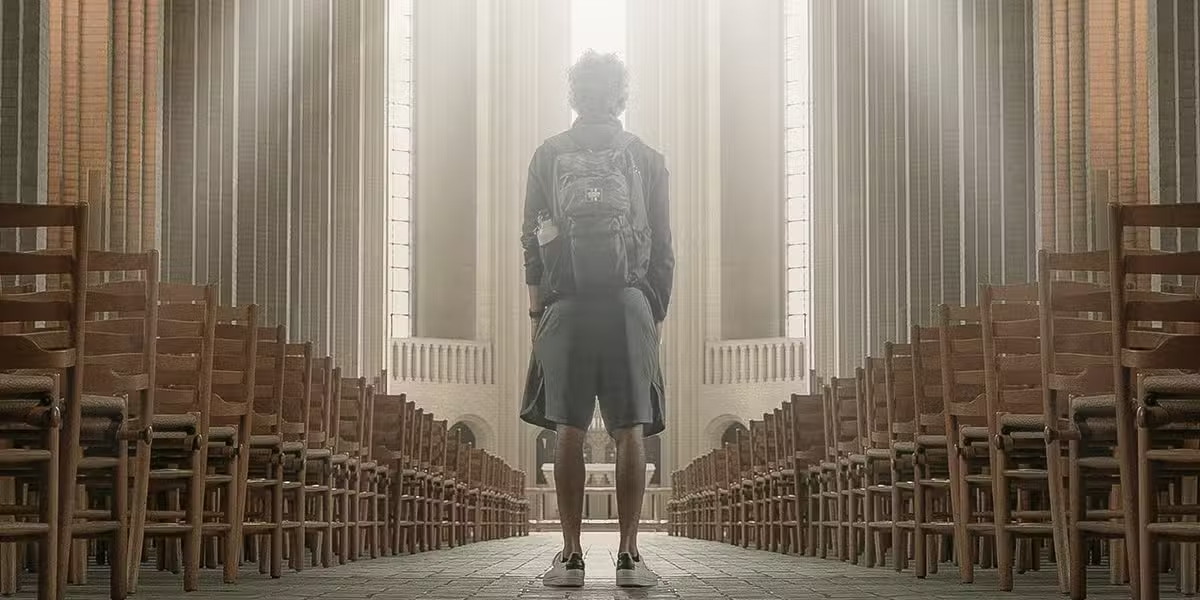The odds were against Kayla McKeon, but that never slowed her down. She now serves as the national spokesperson for the Down syndrome community.
Mark McKeon remembers the doom and gloom of nurses and doctors when his daughter, Kayla, was born 32 years ago. “It was all negative. It seemed like a death sentence,” says Mark, of Cicero, New York. “They said she would not be able to do anything. She might not be able to be toilet-trained or walk.”
Today Kayla McKeon not only walks but regularly strides the halls of Congress to meet with elected officials. She also drives on her own and, smartly dressed like the working professional she is, flies by herself to Washington, DC. She’s the grassroots manager for the National Down Syndrome Society (NDSS), which is headquartered in the nation’s capital. Kayla became the first registered Capitol Hill lobbyist with Down syndrome in November 2017.
Besides advocating for the rights of those with disabilities before elected officials, Kayla gives motivational speeches, hosts a podcast, writes a blog, and generally leads the fast-paced, high-profile, consequential public life of a young adult determined to change the world.
It’s been a remarkable and most unexpected journey, a succession of achievements that has astounded even the two people with the most confidence and belief in her—her parents. But then again, with God on your side—as Mark and Patti McKeon believe, devout Catholics like their daughter—what is not possible?
“We pray to God all the time,” says Mark. “It has to be divine intervention. God has a plan for her to open people’s eyes. It’s so people can know the things that people with Down syndrome can do.”
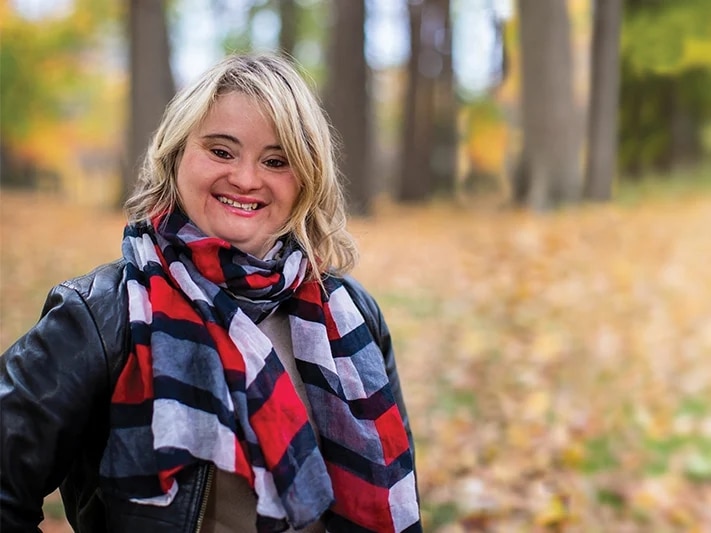
‘One of Our Best Saleswomen’
Kayla McKeon picks up the phone at work. Gentle humor, she knows, helps build bridges and reach common ground. She finishes up by joking that the conversation went well “except for that one hardball question” she asked.
Kayla does not shy away from talking to people and saying what needs to be said. “It comes natural to me,” she says. “I have never been afraid to speak to anyone.”
Kayla spends a lot of work time on the phone or waiting to meet with an official, just like any other lobbyist. Her day is punctuated by a quick trip to Starbucks or a friendly hello in the hall to a coworker, just like any other lobbyist. But she was hired not just because she could do the job but also because in some ways, given who she is and what she has achieved, she can do it better.
She is aware of her distinct role. “It makes me feel great to be able to be a voice for others who don’t have that voice. I feel that being able to share our personal stories is what matters most,” she says.
Sara Hart Weir, president and chief executive of the NDSS, hired Kayla after she had met her on a couple of occasions. “We’re a human rights organization for people with Down syndrome. She puts a human face on the rights for people with it. She puts someone with Down syndrome front and center on Capitol Hill,” she says.
She made a good hire, she adds. “The true test of a lobbyist is: Do they do their homework? She comes prepared to a meeting or a forum. She knows her facts and figures. She’s prepared,” says Weir. “She brings such dignity and grace to her work. She’s dedicated. She’s tenacious. She’s passionate. She’s very articulate.
“She’s one of our best saleswomen. She sells herself. She sells our issues. She sells our organization. She does it with dignity and style.”
Kayla helped successfully lobby for the passage of the ABLE to Work Act in 2017. The bill allows people with disabilities to save money. Previously, a person’s savings could disqualify him or her from receiving Medicaid benefits.
Kayla is currently working on the Transitioning to Integrated and Meaningful Employment (TIME) Act, which would require businesses to pay at least the minimum wage to people with disabilities. An outdated law from the 1930s allows employers to pay less to those with disabilities. “We are trying to end sub-minimum wage. People like me are getting paid pennies per hour, and that’s not fair,” she says.
Among the well-known legislators Kayla has met are former House Speaker Paul Ryan and Senator Tammy Duckworth, a double amputee as a result of her combat wounds. The meeting with Ryan was cordial but perfunctory: “He’s a very busy man, so it was a quick meeting and a photo op,” says Kayla. But talking to Duckworth was fruitful. “Like me, she is differently abled, and we were able to connect that way when I was talking to her about my job and the important work I am doing, ” she says.
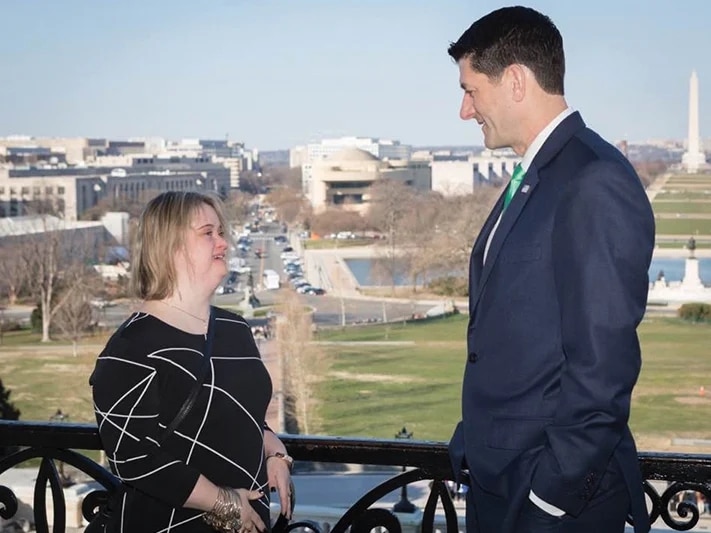
Formative Beginnings
Kayla’s journey to Capitol Hill began in 2014 at a church festival in Syracuse, New York. She ran into John Katko, who was campaigning for Congress. This was their second encounter, as they had already met at a baseball game. Katko had duly handed her his card at their first meeting, and Kayla, a representative for Special Olympics, gave him her card that read “motivational speaker.” The second meeting was more decisive. The candidate promised to have a position for her if he won.
Katko was elected and kept his pledge. Kayla worked as an intern in his office, answering mail and taking care of routine office duties.
Bumping into Katko was an accident, a stroke of good fortune. But Kayla’s parents had painstakingly and lovingly raised her to make the most of her life.
Before her first birthday, they arranged for a physical therapist to come to their home to work with her. Not long after that, they incessantly read to her. One day, when she was 4 years old, she picked up a book and started to read.
“OK, she memorized it,” recalls her father. “Holy cow, no, she knew how to read!”
And so it went with young Kayla. Her parents watched in amazement as she progressed further and further. “We thought, Maybe she can do this or do that. Then she’d do it. She kept exceeding expectations,” says Mark. “We thought, OK, let’s just see what happens. Let’s just see what she can do.”
The McKeons insisted that their daughter attend regular classes in the local elementary and high school, relatively unusual for that time. Educators were not always in their corner. “We fought every year to keep her in a regular classroom,” says Mark.
Kayla struggled with some classes. Her parents helped her with her homework as needed, and eventually an aide at school provided further assistance. Kayla persisted and earned her diploma.
Other challenges occurred. There was one stretch—not known to the McKeons until later—when their daughter was eating lunch alone in high school. But then members of the football team saw what was happening and decided to come to the rescue. “They sat with her!” recounts Mark. “Her personality saved her. People are attracted to her.”
The McKeons, along with Kayla, figured it out as they went along. Originally, they enrolled her in programs, such as dance class, alongside her nondisabled peers. “But it was hard to keep up,” says Mark. “Special Olympics opened a new world for her.”
Kayla became involved with Special Olympics at age 13 and has never looked back. She’s made friends and made speeches. She’s competed in soccer, softball, bocce ball, floor hockey, and track and field. In the 2011 Special Olympics World Summer Games in Athens, Greece, she won silver and bronze medals.
But it’s the camaraderie she treasures most. Kayla relishes the freewheeling, let-your-hair-down spirit of friendly sports competition. “I love playing floor hockey when I’m the goalie and can talk smack with the other team,” she says. “I hope it catches them off guard when I say, ‘Hey, pretty boy, you want a piece of me?’ or ‘Not in my house!'”
All along, the McKeons were careful not to regard their daughter as someone who needed help but as someone who could help. She has volunteered for the YMCA and a local hospital and worked at restaurants and grocery stores. Her parents “always have my back not 100 percent, but 120 percent,” she says. “My parents taught me to never give up and always keep going. They teach me to be humble and thank God for all my blessings. We have a bond that will never be broken.”
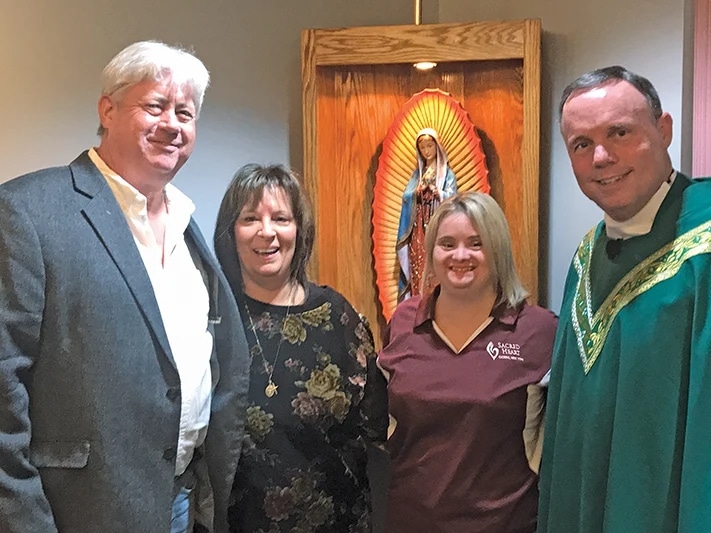
Grounded in Prayer
Outside Sacred Heart Church in Cicero stands a large statue of the Holy Family. “The Sacred Heart Family” is emblazoned on its base. The parish is the solid base for the McKeons. On some Sundays, the three McKeons serve together as eucharistic ministers.
“You can see the people walking toward us—toward Kayla—with a smile. It warms your heart,” says Mark, who was an altar boy and attended Catholic school from grade school through college.
“I like it [being a eucharistic minister] because I want to be more involved in the Church,” says Kayla. “I like serving because I feel more connected to God and Jesus Christ.”
Growing up, she took religious education at the parish and played roles in church pageants. She and her father pray together when he drives her to the airport for trips to Washington, DC, and for speeches throughout the country to advocate for those with disabilities. “We pray for a safe journey. We pray to open people’s eyes, ” says Mark.
Kayla also reads the Bible in the morning to center herself before a long day at work or just to remind herself what’s important. “I don’t have a specific prayer that is a favorite, but I like doing the Act of Contrition, saying I’m sorry. I know there is always room to love God with your whole heart and always room to reconcile with him,” she says. “I pray for my family and friends, so they can lead a life full of love and prayer.”
Prayer is a lifeline for her. “I don’t know how to talk about my feelings, but I know I can turn to him because I know he is always listening,” she says.
Assigned to Sacred Heart Church in 2015, Father Richard Prior distinctly recalls meeting Kayla for the first time in the sacristy. “She was one of the first persons I met. She introduced herself to me,” he recalls. “There’s such a joy to her. She just exudes gratitude. I don’t think she’s ever had a bad day.”
A Life of Meaning
Kayla recently flew to Atlanta to speak before 900 human resources professionals on diversity in the workplace. She also recently traveled to New York City for a presentation at the New York Stock Exchange on “Getting to Equal.” By now she’s an old hand at public speaking.
“I never get nervous because the audience are people too. I treat it like having a conversation with a neighbor,” she explains.
Kayla is comfortable with who she is and fervently desires that others be comfortable with her. “I wouldn’t change having Down syndrome because it makes me who I am,” she says.
“Get to know us better because we are people just like you,” Kayla continues. “Don’t bully us and don’t squash our dreams. We love being who we are.”
By now she is a celebrity of sorts. Smashing expectations, soaring far beyond what’s seen as normative for someone with Down syndrome gets people’s attention. The CBS Evening News, the BBC, the Washington Post, and other news outlets have all done stories on her.
But the secular media can miss the deeper meaning of her life, a message for everyone else.
“We’re all children of God,” says Father Prior. “He gave us talents and abilities. When we’re open to God’s grace, we can use what God has given us to make a difference in the world.”

